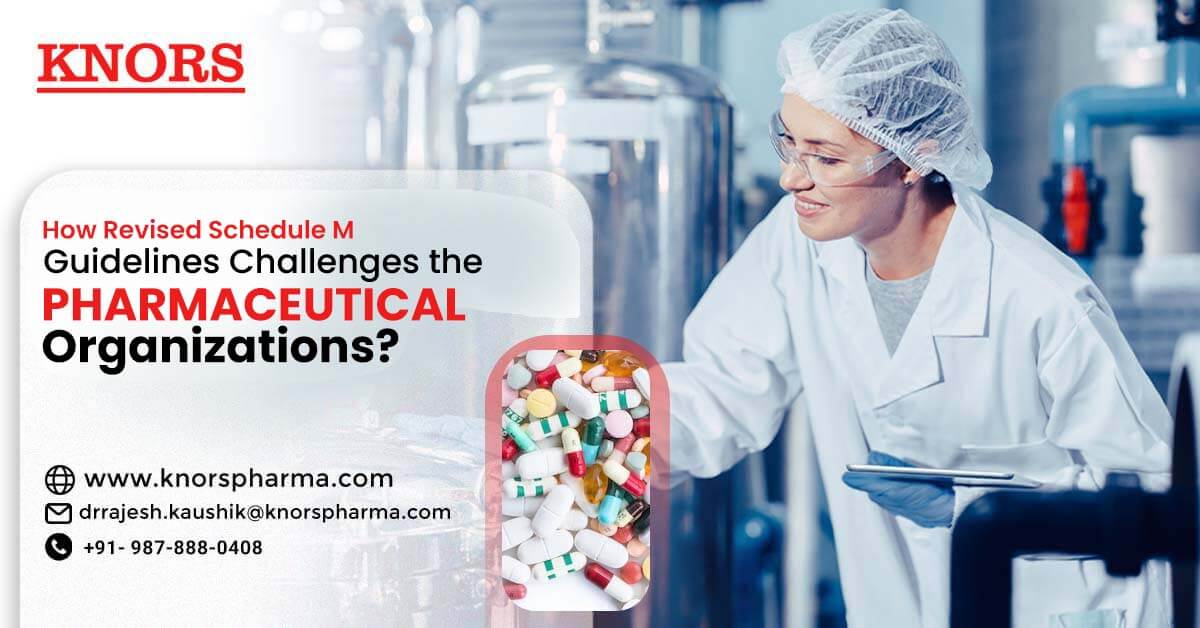The Indian pharma scene is changing super fast. Following the rules is way more important than anything else. The provisions of the revised Schedule M have introduced basic standards for the manufacture of drugs. It is also introduced maintenance of quality and records, & storage. These regulations ensure that products are safe, uniform & dependable.
Pharmaceutical companies are also dependent upon professional associates to adapt to changes. These guidelines are applicable at every stage of production, i.e., from the procurement of raw material to the ultimate delivery. Though quality and safety are enhanced through them, operational challenges also arise.
Furthermore, infrastructure should be upgraded, records should remain proper, and people should be trained. Strategic advice and planning are needed at the professional level in order to keep current with requirements, remain penalty-free, & gain credibility within the marketplace.
Understanding the Revised Schedule M Guidelines for the Pharmaceutical Industry
Essential Facility and Layout Standards
Schedule M requires proper ventilation, correct segregation of production areas, and proper layout. This minimizes the chance of pollution & improves productivity.
Quality Control and Rigorous Testing
You’ve also got to have effective systems for checking your raw materials, intermediates, and final products. Moreover, these prevent product deterioration and patient safety.
Documentation and Compliance Needs
Proper records of the production of batches, equipment cleaning, and maintenance are mandatory. Records assist traceability and easy auditing.
Skilled Workforce and Training Programs
Trained individuals should conduct production, quality control, and regulatory operations. Continued training serves as a base for balancing the altered, revised Schedule M guidelines.
Storage and Distribution Standards
Proper storage conditions, proper packaging, and secure distribution routes are of paramount importance. These prevent product degradation & patient safety.
Impact of Customized Revised Schedule M Rules on Production
The amended revised Schedule impacts businesses through several avenues. Pharmaceutical businesses have to react instantly to stay competitive:
- Processing facilities require structural modifications to attain standards of cleanliness, segregation, and air flow. Hence, initial costs are high but improve long-term efficiency.
- More checking and testing during manufacturing guarantees the consistent quality of products. Businesses invest their resources in laboratory facilities, high-quality personnel & analytical equipment.
- All production steps are required to be documented, e.g., batch sheets and cleaning logs, and calibration records. Moreover, accountability and compliance are facilitated.
- Standard operating procedures avoid errors and guarantee reproducibility. Hence, companies receive a uniform quality of product from batches.
- Periodic verification entails ensuring compliance with guidelines. Furthermore, pharmaceutical manufacturers ought to keep records current & produce evidence of compliance at all times.
Compliance Issues That Pharma Companies Must Address
Implementation of the updated revised Schedule M guidelines entails both cost and operational issues. Upgrading facilities and setting up advanced quality control systems are extremely investment-intensive. Recruitment and retention of trained personnel are also concerns.
Furthermore, it’s challenging to align deadlines for production with compliance. Failure to make changes to processes at an early stage could upset the supply chain. Organizations are required to check equipment calibration, maintain training of employees, and report correctly. There is intense scrutiny from regulators, & ignoring them could introduce fines or suspension.
Effective Adaptation Strategies to Meet the Revised Schedule M Guidelines
- Investing in World-Class Facilities: Upgrade production facilities, storage rooms, and ventilation systems to current schedule M specifications.
- Install Advanced Quality System: Construct automated testing, in-process checking, and certified laboratory facilities to ensure the reliable quality of products.
- Train and Certify Employees: Periodic training programs and certifications keep personnel up-to-date with the latest regulatory requirements.
- Keep Suitable Records: Keep extensive production records, records of cleaning, maintenance records, and quality check records for auditing purposes.
- Plan Internal Audits: Do regular mock inspections and internal audits so you’re always ready for those regulatory inspections.
Final Reflections
The newly revised Schedule M guidelines both challenge and offer opportunities for pharmaceutical companies. Adherence ensures product quality and safety, regulatory integrity, & marketplace trust. KNORS Pharma, as a drug regulatory affairs service provider, helps pharma companies to navigate through changes and keep operations smooth and of consistent quality.
KNORS Pharma provides pharma GMP audit services, which help pharmaceutical enterprises, adapt to the revised Schedule M guidelines efficiently. Professional advice, such as that of KNORS Pharma in regulatory affairs consulting services, enables an organization to navigate through such challenges while operating efficiently, minimizing risks & achieving long-term compliance. Training of staff and investment in equipment & documentation are the key tools used to combat these challenges. By adopting these mechanisms, businesses can achieve increasing success over time and at the same time adhere to revised Schedule standards.
Frequently Asked Questions (FAQs)
Why are the new changes in the revised Schedule significant for pharma companies?
This will guarantee product safety, quality uniformity, and regulatory compliance and secure the company’s reputation in its market.
In what ways does the revised Schedule M affect day-to-day manufacturing operations?
Facilities, process controls, quality tests, and record systems all need modernization to affect production volume first and ultimate efficiency.
What challenges usually arise while adopting the revised Schedule guidelines?
Capital investment in a big way, trained personnel shortfall, frequent auditing, process alignments, and continuous monitoring are typical issues.
What are the most efficient adaptation methods for the revised Schedule in pharma companies?
Invest in infrastructure, train personnel, implement sophisticated quality systems, and maintain records. Moreover, it will seek professional consultancy from experts like KNORS Pharma’s regulatory affairs.




